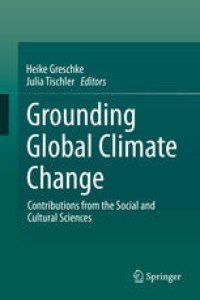
Ebook: Grounding Global Climate Change: Contributions from the Social and Cultural Sciences
- Tags: Environment general, Social Sciences general, Humanities general, Climate general, Geography (general)
- Year: 2015
- Publisher: Springer Netherlands
- Edition: 1
- Language: English
- pdf
This book traces the evolution of climate change research, which, long dominated by the natural sciences, now sees greater involvement with disciplines studying the socio-cultural implications of change. In their introduction, the editors chart the changing role of the social and cultural sciences, delineating three strands of research: socio-critical approaches which connect climate change to a call for cultural or systemic change; a mitigation and adaption strand which takes the physical reality of climate change as a starting point, and focuses on the concerns of climate change-affected communities and their participation in political action; and finally, culture-sensitive research which places emphasis on indigenous peoples, who contribute the least to the causes of climate change, who are affected most by its consequences, and who have the least leverage to influence a solution. Part I of the book explores interdisciplinarity, climate research and the role of the social sciences, including the concept of ecological novelty, an assessment of progress since the first Rio climate conference, and a 'global village' case study from Portugal. Part II surveys ethnographic perspectives in the search for social facts of global climate change, including climate and mobility in the West African Sahel, and human-non human interactions and climate change in the Canadian Subarctic. Part III shows how collaborative and comparative ethnographies can spin “global webs of local knowledge,” describing case studies of changing seasonality in Labrador and of rising water levels in the Chesapeake Bay. These perspectives are subjected to often-amusing, always incisive analysis in a concluding chapter entitled "You Ain’t Seen Nothing Yet: a death-defying look at the future of the climate debate." The contributors engage critically with the research subject of ‘climate change’ itself, reflecting on their own practices of knowledge production and epistemological presuppositions. Finely detailed and sympathetic to a broad range of viewpoints, the book sets out a profile for the social sciences and humanities in the climate change field by systematically exploring methodological and theoretical challenges and approaches.
This book traces the evolution of climate change research, which, long dominated by the natural sciences, now sees greater involvement with disciplines studying the socio-cultural implications of global warming. While most of social climate change research focuses on how people deal with environmental stresses and possible ways of adaptation, this volume foregrounds the question: What are the theoretical and methodological challenges of investigating climate change in different disciplines?
In their Introduction, the editors chart the changing role of the social and cultural sciences in climate change research, delineating different research strands that have emerged over the past few years. Part I of the book explores the prospects and challenges of interdisciplinarity in climate change research, connecting the points of view of a plant ecologist, a historian and a social anthropologist. Parts II and III provide ethnographic insights in a wide range of ‘climate cultures’ by exploring the social and cultural implications of global warming in particular contexts and communities, stretching from hunter communities in the High Arctic and the Canadian Subarctic over Dutch and Cape Verdian island communities and the metropolitan citizens of Tokyo to pastoralist families in the West African Sahel. Thereby, Parts II and III explore ethnography’s potential to produce locally-grounded knowledge about global phenomena, such as climate change.
Uniting the different approaches, all authors engage critically with the research subject of climate change itself, reflecting on their own practices of knowledge production and epistemological presuppositions.